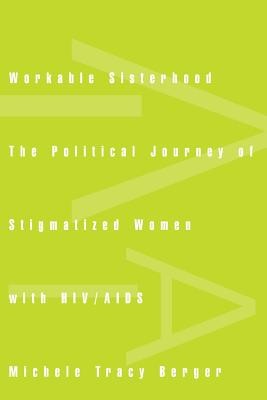
- We will send in 10–14 business days.
- Author: Michele Tracy Berger
- Publisher: Princeton University Press
- ISBN-10: 0691127700
- ISBN-13: 9780691127705
- Format: 15.9 x 23.5 x 1.5 cm, softcover
- Language: English
- SAVE -10% with code: EXTRA
Reviews
Description
Workable Sisterhood is an empirical look at sixteen HIV-positive women who have a history of drug use, conflict with the law, or a history of working in the sex trade. What makes their experience with the HIV/AIDS virus and their political participation different from their counterparts of people with HIV? Michele Tracy Berger argues that it is the influence of a phenomenon she labels "intersectional stigma," a complex process by which women of color, already experiencing race, class, and gender oppression, are also labeled, judged, and given inferior treatment because of their status as drug users, sex workers, and HIV-positive women.
The work explores the barriers of stigma in relation to political participation, and demonstrates how stigma can be effectively challenged and redirected. The majority of the women in Berger's book are women of color, in particular African Americans and Latinas. The study elaborates the process by which these women have become conscious of their social position as HIV-positive and politically active as activists, advocates, or helpers. She builds a picture of community-based political participation that challenges popular, medical, and scholarly representations of "crack addicted prostitutes" and HIV-positive women as social problems or victims, rather than as agents of social change. Berger argues that the women's development of a political identity is directly related to a process called "life reconstruction." This process includes substance- abuse treatment, the recognition of gender as a salient factor in their lives, and the use of nontraditional political resources.EXTRA 10 % discount with code: EXTRA
The promotion ends in 20d.00:08:31
The discount code is valid when purchasing from 10 €. Discounts do not stack.
- Author: Michele Tracy Berger
- Publisher: Princeton University Press
- ISBN-10: 0691127700
- ISBN-13: 9780691127705
- Format: 15.9 x 23.5 x 1.5 cm, softcover
- Language: English English
Workable Sisterhood is an empirical look at sixteen HIV-positive women who have a history of drug use, conflict with the law, or a history of working in the sex trade. What makes their experience with the HIV/AIDS virus and their political participation different from their counterparts of people with HIV? Michele Tracy Berger argues that it is the influence of a phenomenon she labels "intersectional stigma," a complex process by which women of color, already experiencing race, class, and gender oppression, are also labeled, judged, and given inferior treatment because of their status as drug users, sex workers, and HIV-positive women.
The work explores the barriers of stigma in relation to political participation, and demonstrates how stigma can be effectively challenged and redirected. The majority of the women in Berger's book are women of color, in particular African Americans and Latinas. The study elaborates the process by which these women have become conscious of their social position as HIV-positive and politically active as activists, advocates, or helpers. She builds a picture of community-based political participation that challenges popular, medical, and scholarly representations of "crack addicted prostitutes" and HIV-positive women as social problems or victims, rather than as agents of social change. Berger argues that the women's development of a political identity is directly related to a process called "life reconstruction." This process includes substance- abuse treatment, the recognition of gender as a salient factor in their lives, and the use of nontraditional political resources.

Reviews